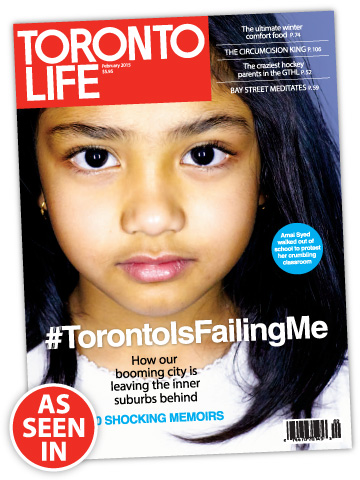In the News
 I was terrified of having my son circumcised – until I found the best guy for the job!
I was terrified of having my son circumcised – until I found the best guy for the job!
As seen first in the February 2015 issue of Toronto Life
My son, Ezra, was born last spring—a jarring six weeks early, after more hours of labour than I care to remember. At six pounds, three ounces, he was by far the biggest baby in the neonatal intensive care unit, but to me he was the smallest creature in the world. Eight days later, he was released into the care of his two first-time moms. My partner, Sarah, and I were filled with an urgent mix of elation and terror.
If you have a son, before he can smile or see further than your face, you will have to make a decision about the irrevocable alteration of his genitals. It’s a relatively new parental conundrum. Just a few decades ago, circumcision was routine in Ontario. Foreskins were lopped off—ceremoniously or unceremoniously—as a matter of hygiene. But penis culture is changing. Canada’s paediatricians have deemed the procedure medically unnecessary, effectively tossing the harrowing decision back to parents. I wasn’t sure what to do: the idea of subjecting Ezra to pain, however fleeting, caused a persistent ache in my gut.
If it’s hard for the average parents to make such a big decision about their tiny child’s tiny penis, imagine what it’s like when neither of the decision makers has one. A close male friend was amused by our anguish. “I do not remember the procedure. And neither will Ezra,” he said soberly. The naysayers were much more vehement: one person we asked referred to the practice as “genital mutilation.”
What ultimately tipped the balance was religion. Sarah is Jewish, I’m WASPish. Neither of us is a true believer, but it’s nonetheless important for us that Ezra feel connected to Jewish culture, and that outweighed my squeamishness. We would give him a Jewish penis—even if an official bris was not an option under Jewish law, because his biological mom (i.e., me) was not born into the faith.
We called Aubie Diamond, the doctor our midwife recommended, to set up the procedure. “Mazel tov!” he said with genuine enthusiasm, and launched into a description of his ultra-quick Mogen technique, which deploys a clamp and a tiny blade to slice off the foreskin. He was upbeat and likable—a salve for my writhing mind.
Diamond, a family doctor by training and a certified mohel, has completed 9,000 circumcisions over the years and hopes to double that number before he retires. He quit his medical practice two years ago to follow his passion for circumcising. He sees the work as his special gift, a blend of medicine and religion he deeply enjoys, and feels blessed to have found this distinct talent. There are hundreds of circumcisers in the city, but to the best of his knowledge, he’s the only one who does it full-time. We figured with that much experience under his belt, he was bound to be good at it.
A few days after that first phone call, we arrived on his Thornhill doorstep armed with a cheque and the items from his supplies checklist: a topical anesthetic, gauze pads, two tubes of Polysporin and a large bath towel. Diamond had the demeanour of a kindergarten teacher—cheerful and energetic, offering easy-to-understand explanations of what was about to happen—but with the disquieting ability to utter words like “penis,” “shaft,” “foreskin” and “bleeding” while maintaining eye contact.
Diamond checked that the adults were all ready as he smoothed the towel onto his dining room table and placed our little pink boy on it. “Now, who’s going to hold down his legs?” he asked jauntily. I blanched. We were making Ezra go through with it, but I couldn’t. Diamond’s wife kindly pointed me to the backyard. From there, I could make out brief, muffled squalls, then silence. It was over. When I returned a few minutes later Ezra was happily sucking a bit of Manischewitz-soaked gauze.
We couldn’t have a real bris, but Diamond made sure we had a celebration. He brought out a kiddush cup and poured some wine.
Sarah’s father said a blessing. We drank. It may not have been an official ritual, but it felt momentous to fête Ezra’s entrance into this family and to forge this first connection to his Jewish roots. Before we left, Diamond told us about the aftercare (“A yellowish crust and some swelling is normal!”) and performed a final check of the wound. “I like what I see in that diaper!” he said, with a gleam in his eye. To my surprise, I felt proud.
Looking back eight months later, I understand why it was such an ordeal. This was a first step in my journey toward realizing the profound influence we will have on Ezra, in ways we choose and in ways we don’t—accepting the great responsibility of becoming someone’s parents.
Since Ezra’s procedure, I’ve talked to parents who fainted at their sons’ circumcisions or, like me, had to leave the room. While I hope I can remain both present and conscious for future choices, I also hope I continue to writhe—at least a little. I may grow more comfortable with making decisions on behalf of my child, but I wouldn’t want it to get too easy.

